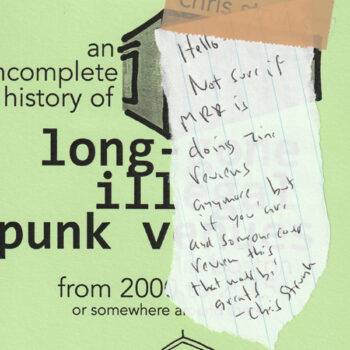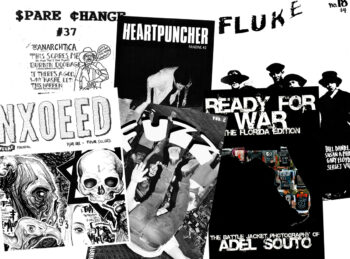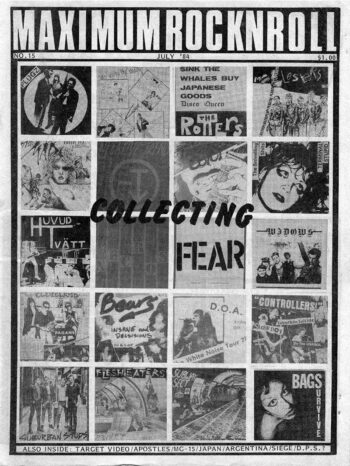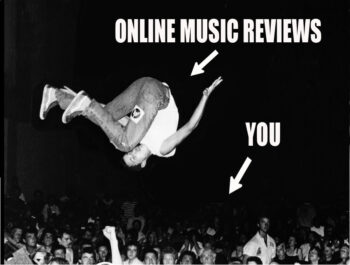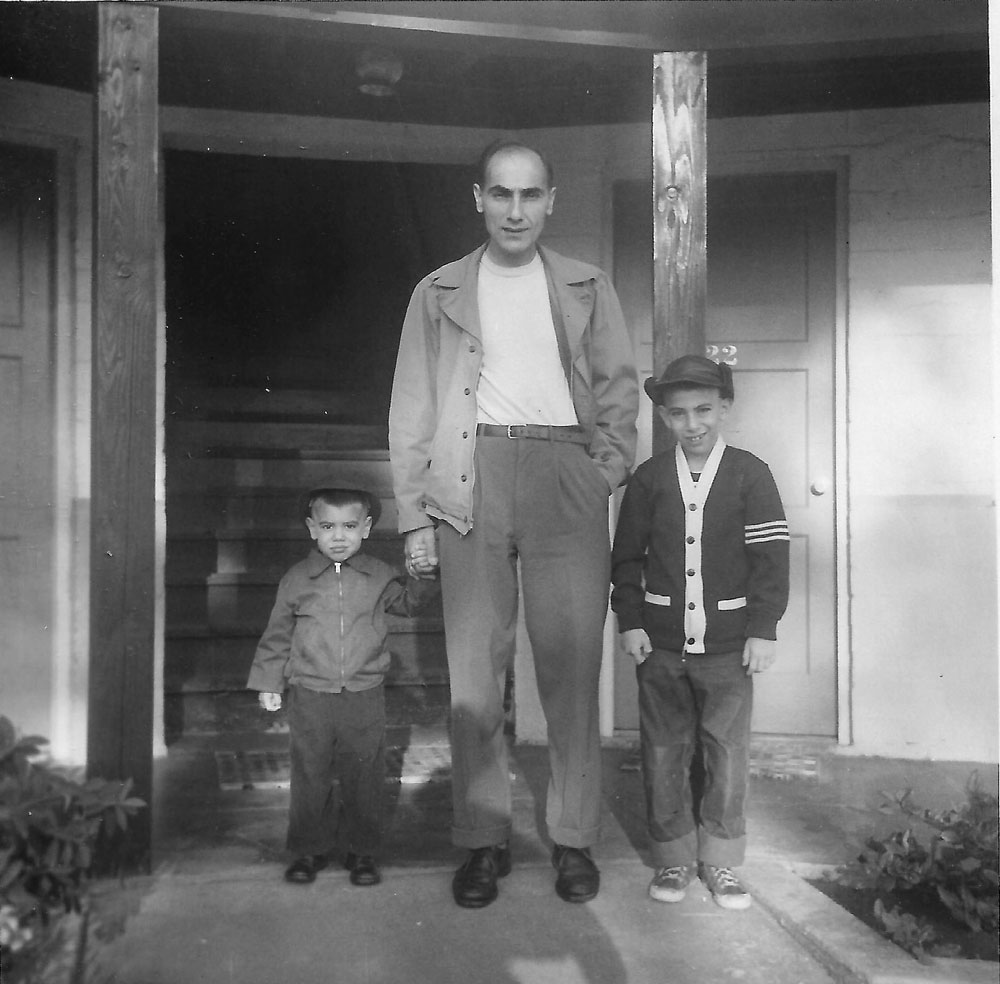Blast From the Past: Raymond Pettibon
This originally ran in MRR #304/Sept 2008 which you can pick up here

The interview started with me walking into his studio and realizing I had left my question sheet in my bag in the kitchen. I was intimidated already and felt super under prepared so I just started rambling about the magazine. Maybe if I had been less nervous and actually asked the questions I planned to rather than resorting to an elaborate five-questions-rolled-into-one confused-sprawl interview style this would have been more focused. So it’s more of a random conversation than an incisive Q and A session. Disclaimers in the introduction? I was so nervous I barely asked about his artwork!
Interview and photos by Layla Gibbon.
MRR: …The way the magazine works, there are two people that are in charge of getting content together, but then some kid in Malaysia can write a scene report about local punk and we would run it. We do have editorial control and there are things we don’t cover, we have a very strong stance in regards to…
Raymond: You keep a strict separation between editorial and the business part of culture, except you run ads.
MRR: (Laughs nervously) I like how strict it is in keeping certain values intact, like we’re pretty much non-profit at this point, and I am sure if we broadened our view we could make a lot more money than we do. But then I like figuring out how to operate in such on such narrow terms, it almost opens up possibilities because you have to figure out how to do things that other magazines probably don’t even have to think about. The nature of the magazine is that you have to be your own boss. There’s no one to tell you what to do, and you have to motivate people to help you do random shitwork, or to contribute content to the magazine with no monetary rewards you know? It’s made me think about the nature of work and free time. Also it makes me happy it’s existed for so long on its own terms.
These books I am making for Wendy, they kind of come from fanzine culture, they have a price on the cover but they sell for so little I am basically giving them away. I like the idea of that. Typically it’s around rock music or comics or films, ham radio, these things that are a labor of love first of all.
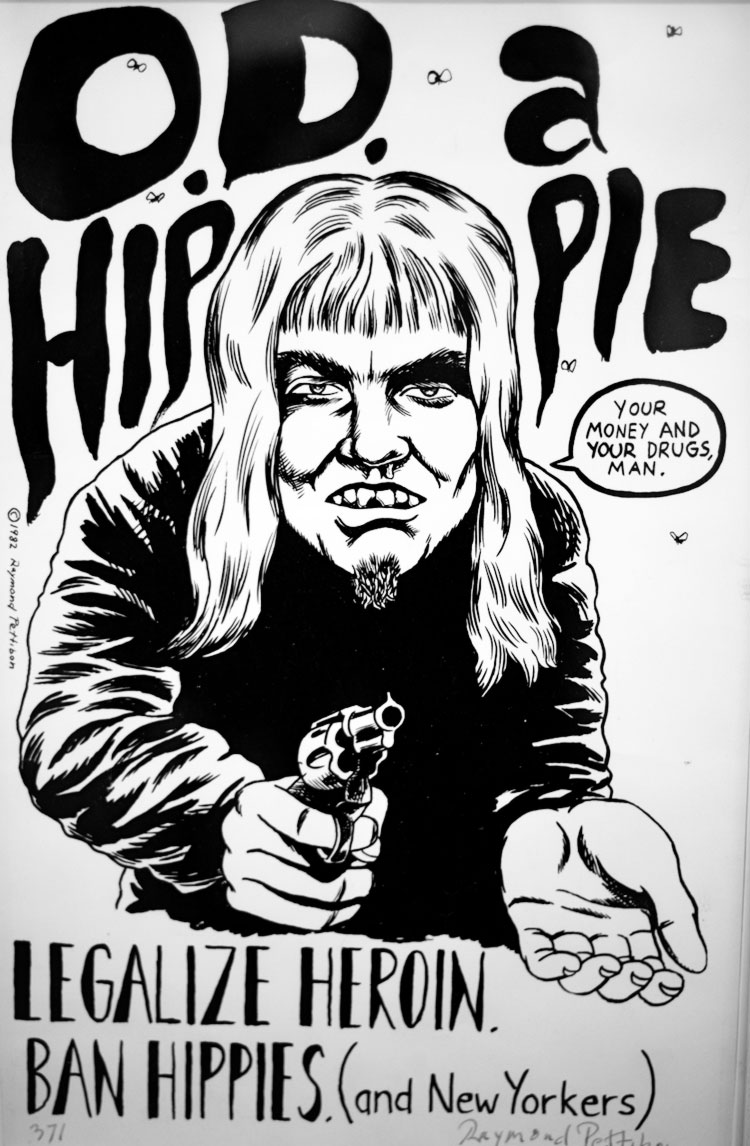
I was talking to a collector yesterday about collecting fliers. One of the things I like so much about punk culture is that it’s very disposable, things disappear and get replaced. I was thinking about this in terms of what you do, it seems like at the time when you were producing your fanzines they had a different value to what they have now. Now they’re precious collector objects, but at the time they had a different meaning, they were made in a different context…
Right, they’re precious objects now for one thing because there weren’t that many of them produced. The idea wasn’t to make collectors items, or precious objects. That sort of thing is done all the time now. A first edition of Superman is worth… I mean you’d have to have a first edition of the bible to rival it now, because they were ephemeral and not considered something worth saving at the time. And that is something that’s true about the fliers I did and others did. The way it played out to where they are collectable and now valued at much more than they were in the first place, that was never a surprise for me. I knew enough about… I had a sense of history about it. At the same time it wasn’t the reason that I did them. I still have some of the original fliers for Black Flag that I made. At the time I tried to persuade them to save at least seven or ten of each one for me, and that wasn’t always possible or agreeable to them I suppose.
I mean they’re worth money, but I’ve never sold one you know? But I probably have a different take on the marketplace than Maximum Rocknroll does; to me, it’s more like a given, an act of nature. To try to avoid it, to manipulate it, to co-exist separately from it is an invitation to become co-opted. I guess “sold out” to use terms that one would be familiar with in punk. I’m the least engaged with the marketplace as one can be. It’s against however I was born and bred, rather than an ideological function. Once I do the work, and it leaves my hands, it’s going to be assimilated into the marketplace and I don’t think that’s a bad or terrible thing either. But I can’t be personally responsible for anything beyond making the work, beyond that, what happens to it, who the hell knows. It’s almost like magic, beyond the bounds of physical laws. For all I know they disappear. There’s a lot of questions and dishonesty in that world.

One of the things I wanted to ask you about is that a lot of your art from the early ’80s refers to the end of the ’60s, the end of that period of euphoria, You reference Manson a lot, who is often used to represent the death of the hippie ideal. I was thinking about it in terms of how people create this perfect nostalgia around the ’60s as if it was only this period of transcendental change. Sometimes it feels like it’s been reduced to an idea or a marketing concept. I like the way your generation was the first to turn that winsome nostalgia into something darker. Less smug and self satisfying, but then now people have eulogized that era, the early ’80s, in the same way. Man I don’t even know what my question is. Is Reagan the new Manson?
They both had a role in destroying the ’60s. Reagan as governor of California was obsessed with college kids; he had a personal pathological agenda, as is the case with right wing politics in general. I mean not just right wing politics. Christ, the right, the left, there are no principles or ideologies. It seems more about taking sides, usually based on wealth and poverty or race, age, youth, or cultural preferences etc. A lot of good came out of that era, if you want to look at it as a whole force of history. But by the time I was doing those drawings, when punk was starting and beginning to flower, if I can use that word in describing punk at all, by then what was left of the ’60s had become in so many ways very degraded and sour to put it in strictly personal terms. Whatever representatives were left of the Haight Ashbury/Sunset Strip scene were not full of loving kindness and peace and tranquility anymore.
I was thinking about how a lot of the punk from England and I guess New York too was created in the spirit of rock n’ roll. Like, basement garage bands that were inspired by things on the Nuggets box set, that primal energy, more like Jerry Lee Lewis rather than ELO. But then the idea of rock n’ roll also existed in their wanting to make it big, which was the case for a lot of those classic punk bands especially in England. One of the things that is really cool about the American hardcore or punk scene is that those opportunities didn’t exist so people had to create their own idea of music. Eventually it becomes codified and it becomes people doing the same thing forever. I like that the audience and the band are just as important in the context of their scene. Adding to that the people that put on the show, and the people that make the fliers and produce the art work are kind of linked in a way that’s more open ended that in the traditional rock idea. Obviously some things are gonna wind up being more interesting than others, but that idea is what really appeals to me about the punk ideal. The idea that people instead of buying it, make it themselves. That was what I was trying to get at with that last question. It frustrates me that it’s become like Henry Rollins and Keith Morris talking about the good old days, not that they don’t have a right to document what happened. It’s irritating the way that people respond to it like it’s a package. I feel like there are ways of engaging with culture production and not becoming someone that just replicates what’s gone before, and becoming irrelevant that punk doesn’t engage with sometimes.
There are a lot of good things and bad things about anything. And nostalgia is a common human trait. I don’t think it’s such a great thing usually, but it’s better in general to look at history as much as one can. People often think of the good times of their life, that’s nostalgia in a personal sense, and there again perhaps it’s more healthy to think of what one could accomplish now. They say when you die your whole life flashes back for you, maybe it’s better to count on that happening rather than living on the past. If it’s more from the kids who didn’t experience it taking hits from whatever is still being passed around, rather than the people who did go through it. You know what the hell does a 15-year old kid know about what it was like in ’77, what punk was, for one thing. It’s all not all such an insidious thing or evil. In general, I do think it’s good to work in the present, to work on the future rather than live in the past; to make something out of existence and circumstances.
I don’t mean that in living in the present one has to be completely cut off from the past at all. Past influences are everywhere and since the time of the Victrola or the phonograph, music is something that…I mean records don’t all wear out, any kid can listen… that’s a great thing. But if it’s just a complete copy, hell who needs that particularly? In punk they went through their rockabilly phase, but it’s hard to imitate or duplicate Jerry Lee Lewis. I suppose if one adopts the pompadour. But that’s not really important any way. There’s a whole underground of imitation tribute bands. How many records did Sha Na Na sell?
Punk doesn’t come out of a vacuum, rock n’ roll didn’t and just the rudiments, the technology I guess of loud instruments and amplifiers and fast beats, there are always going to be new generations of kids in bands who are going to be into that. Maybe if a Martian came down they wouldn’t be able to tell the difference between heavy metal and or disco and electronica and all that.
You’re right about the difference between England and the US in that the DIY pulling yourself up by your own bootstraps and having to market or make every part of the process yourself because there’s absolutely no record company interest in it. You had to start in a garage and however by whatever miracle you get an audience at all. In England it’s such a tabloid culture you have a million newspapers and they all want to know much more about what’s topical and to shock. To just go on TV and say some four-letter word and cause a big cause célèbre. That’s impossible here, it’s not the same situation, in the art world as well it’s very different in that sense

In England modern art is something that is constantly discussed by the tabloid media, like the front page will be a headline of outrage about whoever was picked for the Turner prize, whereas you can’t imagine something like that happening in like the NY Post.
The closest would be when it became a really important fundraising issue and way to draw support for the right wing, to attack art. Hell, that and gay rights and abortion issues raised more money to keep the radical right afloat in the ’80s. Mapplethorpe, Serrano, civilization’s going down the drain because of these people; to make an issue out of such a pittance of public funding.
It seems like a lot of funding for the arts comes from those corporations that funded those right wing groups in the ’80s.
Well, corporations hedge their bets, they’ll support both sides. That’s why a lot of the left, whatever is left of the Marxist left, or Chomsky or whatever, starts with the corporation, big business, the marketplace as the big evil. Their participants who do a lot of bad things. To me that’s not the originating problem—it’s the forces of government. Any concentration of power is not going to be lacking for participants and people who wanna get involved in it.

My roommate tried to convince me that I am an Anarchist. My problem with that ideology is that it’s rooted in an ideal world that could never exist
Everyone has their own idea, there’s nothing wrong with having some concept of utopia somewhere in the back of your mind, it’s never gonna be this arrival but you can engage with it. Politics is defined by forces, strange physical dangerous forces; the police, government. To be engaged politically is going up against such a great number of forces and that means everything only happens with small steps. I’m not saying that it’s all futile and not worth doing, I think it’s good to have a sensible head on ones shoulders about it.
So, viewing political ideas as a process rather than an end. I think it’s really easy to feel betrayed by an idea if you expect salvation, or just to become really cynical and just opt out. Also, how the right wing is able to position its viewpoints as the “natural” way. And people don’t get that a lot of these ideas aren’t “natural” but are just constructed traditions.
I would call myself basically an Anarchist as well. When one’s put under the interrogation lights and expected to explain or defend a utopian rationalization… The other side doesn’t have to do that. We just have to accept what we have now if we agree with it in the first place.

You can’t exist in a total vacuum, you have to create things for… I don’t know, things exist to be consumed in a certain respect. Music doesn’t exist outside of the market, but I like the things that exist for an audience who then get inspired to make things on their own terms rather than just be “the audience.” I guess I just get frustrated by the culture of nostalgia, and not necessarily that people shouldn’t look back to old ideas. Just the constant replication, and how formerly revolutionary ideas get turned into advertorials. The way that the ’60s have become a shirt you can buy. One of the things I was thinking about is that the guy that started OZ magazine, which was an English satirical irreverent political underground magazine, is now the publisher of Maxim magazine…
That’s the most worthless transition. If I was looking to make it in ’69 in journalism or publishing, I would have had to have close to a Maoist position to get in the game in the first place because that’s what was selling at the time, so that was what was going to be marketed. There are so many of those people. Who’s a more despicable publisher or journalist or whatever you wanna call him than the guy at Rolling Stone magazine, who’s that jerk off—Bob Guccione Jr. Does one really believe that there was some change of ideology, morals ethics, some embodiment of whatever you want to call it that took place from the time he was putting John and Yoko on the cover to this point? Were these good guys then and bad guys now? Whatever one thinks of what they were doing at the time, it’s good to be at least suspicious sometimes of those kind of things and critique the message rather than the svengali or the wizard of oz behind it. There were bourgeois hippie business men in ’67 Haight Ashbury all you heard about, all the complaints and so forth, lost my train of though once again… One can take it or leave it. What does that really amount to; bellbottoms and paisley come back in style, so what? The first time a kid listens to The Velvet Underground or Elvis or Black Sabbath or whoever it is, it’s new to them. I mean hell, speaking of The Grateful Dead you can spend your whole life if you live up to be 150 listening to their tapes right? Consciousness is constituted from so many sources and passed down to ones succeeding generation. It can be a great thing to harbor enthusiasms for a certain kind of music, if it becomes important or meaningful enough all it’s going to do is influence one to go somewhere else with it you know? I mean that’s one of the best things about rock, or especially in rap music, the samples, direct influences that it kind of taking an influence but giving a nod or a credit to it at the same time. It’s a historical continuum that is a largely positive.
 It’s one of the more inspiring things about culture, that someone can take something and change the meaning entirely.
It’s one of the more inspiring things about culture, that someone can take something and change the meaning entirely.
Well you see the idea has a lot of importance when you see from where it’s being attacked. The record industry, the publishers, the copyright owners, all of this bold historic capital that is wanting to hold on as much as they can to what… well not what they made for Christ’s sake! For Michael Eisner to be able rewrite copyright laws almost indefinitely because of his political power. That motherfucker, why stop at him. Well Walt Disney didn’t draw more than a straight line, or the squiggle of Mickey Mouse’s tail but at least he was there when those things were created. There is management and the idea… Even the CEOs and the management, they do a productive thing in the economy. It’s possible, but in this case, using political power to change the law of the land, to stem the exchange of ideas and communication of one’s talents with one’s peers and with future generations as well. I don’t know what Mickey would say. I don’t know if he went over to the other side. He was always their kept boy. Donald Duck was more subversive, and Bugs and Daffy, the Warner Brothers, Chuck Jones; those cartoons were much more subversive than what Disney was selling with that whole program.
 Well Disney solidifies the idea of America. I think it’s interesting, I like going to Disneyland, but it’s definitely part of the creation of a mythical past, of the “natural” way things should be.
Well Disney solidifies the idea of America. I think it’s interesting, I like going to Disneyland, but it’s definitely part of the creation of a mythical past, of the “natural” way things should be.
When you’re selling a myth to that great of a degree that Disney was, it doesn’t necessarily follow but so often it comes out that the reason behind it is to obscure the reality… He was very abusive with his animators, his workers, his politics were abhorrent. The economic history or the business history of animation, cartoons, comic books is really something to make you think. Think about Siegel and Shuster who created Superman, one of the most important contributions, for bad or good, leave that aside. Superman I don’t admire as a character, as a figure he’s kind of one of Giuliani’s boys, but the kids who created him were like 15-years old. They were just so cheated and abused their whole lives. When you have an asymmetric, uneven balance of power within an industry, especially in something such as comics which aren’t respected anyway, especially the people that draw for them, it’s inevitable that they are going to be taken advantage of in the market place. That’s still going on, it’s a right of passage for rock musicians and for artists as well, it’s just a right of passage to be cheated.
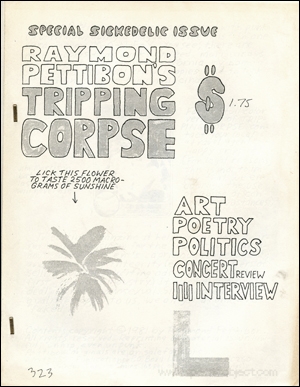
I read in this letter that one of the Chambers Brothers wrote that they don’t own the rights to their music at all. Their music gets used in commercials and places that they wouldn’t themselves sell it to, that song “Time Has Come Today” is so ubiquitous. They don’t get a penny from it. I think it’s the same thing with Creedence…
Yeah Fantasy records, John Fogerty had this thing with Saul Zaentz, the owner of Fantasy, it just consumed him for more than a decade to where he wouldn’t do anything in music. He was just in the courts, it split up his family, his brothers… That’s going to go on because whatever the law says, and the laws are made by whoever has the most money and that’s the reason why there are campaign contributions at all. I can’t think of anything more disgusting than that to give a cent to any politician, over and above what you pay taxes for. That’s not done for spirited civic duty, I’m sure there’s fools that would you know…
Well, do you think it’s even possible to get into a career of politics without having some…
There is any number of reasons that a person can do anything. Human beings are capable of doing shocking and unheard of things, you hear about it on the news, we are capable as a species of doing unspeakable things. You can go in with Pollyannaish pure thoughts into politics, you won’t go anywhere. I mean this last election, the primaries, I mean by now the public is not in favor of the Iraq war, there were three candidates, Ron Paul Kucinich, Gravel, who weren’t. Paul’s case, he’s an interesting figure, that he has office at all on a local level is remarkable, Kucinich has a history in politics, Gravel was part of the Pentagon Papers. So there were three admirable choices, but the system isn’t going to let that happen and politics is not about getting the right person. The way it’s posed is pathetic, as if they’re saviors.
The problem is democracy itself, American style democracy is responsible for more evil around the world than any other system and to glorify it as some kind of sanctified feel-good, America at it’s best, to sell it. Selling and buying? Hell, I’d go for that. It’s not selling, going in with aircraft carriers and passing our Hershey kisses to the children. By now it’s not acceptable to claim innocence about these things, to claim that America had good intentions of going into Iraq and of course it didn’t work out, and of course blaming the Iraqis themselves. I don’t have any natural proclivities to be Anti American, I’m anti-government. America happens to be what we’ve got.
America and Israel are the two most evil forces in the world and those are the shining examples of democracy. Democracy is a system where every four years you export violence in the form of massive invasions and shock and awe bombings basically for the political purposes of getting reelected. That is a system that is widely supported by Americans because the consequences are largely exported. How can you be more hawkish than Bush? Ask Hillary and Obama.

It really freaked me out in the primaries when Hillary was talking about nuking Iran as a viable recourse…
That’s how you get elected
Is it just rhetoric, how people talk…
It’s more than talk. If you know anything about American politics you know about the lengths people will go in order to remain in power. To start a war sky rockets your popularity but then you are left with it, after the honeymoon. Starting it is one thing, fighting it, occupying and keeping it is another. When McCain says 100 years, that’s not something to dismiss. America is building an insane number of military bases in Iraq—I mean they complain about Saddam’s opulent palaces… These aren’t boy-scout camps.
So you think the Iraq war is just a strategic military…
No. America doesn’t have a foreign policy. America’s foreign policy is Israeli foreign policy and it’s the right wing of Israeli politics. It’s like here, most Americans are against the war, most Israeli’s are not in favor of permanent war and violence. It’s very little to do with anything else except American and Israeli electoral politics. That’s why I’m not a champion of democracy, not as we have it here where there’s no rein on… It’s a system. It’s not like, “well we’ll get better people next time.” For one thing they go through these paroxysms of campaign reform and of course it’s politicians doing campaign reform. Now it’s almost impossible for an incumbent to lose. That’s campaign reform. Even if Jimmy Stewart, Mr. Smith goes to Washington…

I have to ask you a few questions about punk and Black Flag, this is for a punk magazine you know.
Oh yeah, I am sorry I didn’t mean to talk so much about politics…
I was really worried about doing this because I’m not from the art world, and obviously I’m not well versed in that language.
It’s OK.
I wanted to talk about how important your art was in forming an image of Black Flag and how it contributed to people’s idea of them—did you feel part of that culture?
Less as an artist though, because punk was much more about music. Anything about art or the art world, that was a very dismissive or insulting word to use, art or artiness was a derision. You know I don’t know. I doubt it, it’s impossible to know, but I doubt if my art had much affect on the course of Black Flag or punk.
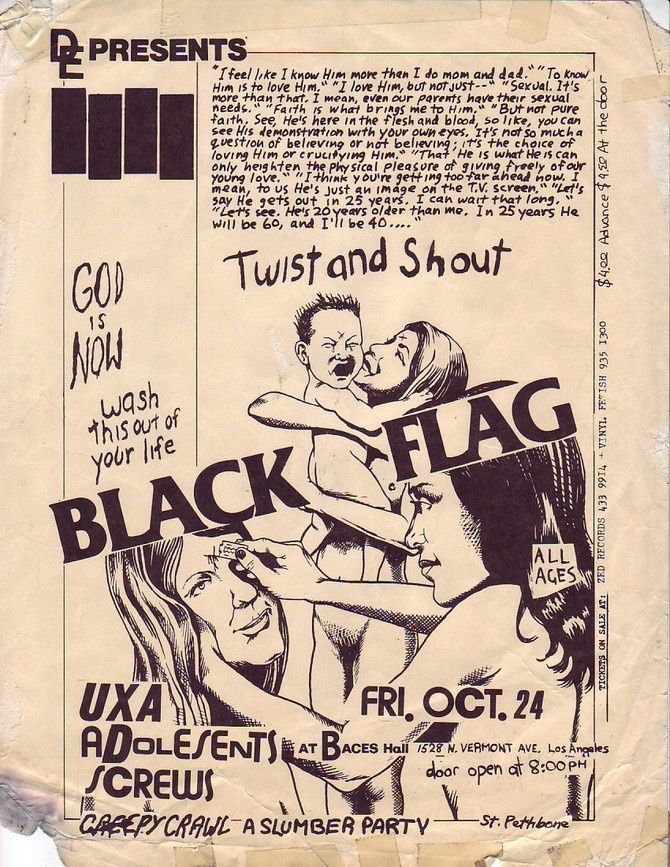
I guess I meant in terms of the visual identity of the band?
Yeah but if it wasn’t me if would have been someone else. At the time I was glad to do it, I’m not trying to disassociate or to put it as if it was anything of a regret. Punk is almost exclusively about music. I mean there’s fashion or anti-fashion and all of that, and there are issues that uh punks tried to get worked up on… (phone rings)

I wanted to ask you about the record you made, Super Session. How did that happen?
For whatever reason, there are a lot of odd reasons why records get made by unlikely people from some other part of show biz. I guess art is… Anyway the guy from Blast First asked me if I would do a record, his idea was that I would do a compilation with other people’s music. I guess he did that with Robert Williams, and with the English artist um, who did early punk stuff… um…
Savage Pencil?
Oh yeah. And Robert had his own point of view I guess that related; I don’t know what I’d do in that circumstance. It’d just be someone’s mix tape, so what’s the point. So it was just a standing offer. I thought I might as well do my own music or anyway my own lyrics. I didn’t perform or sing. I mean I’m not a musician or an instrumentalist. I sing maybe one song on it. But I liked writing songs, and I’ve continued since then, I’ve done other records, but I don’t know if you or anyone else would have likely have heard of them. It’s like my fanzines except even harder to… It’s the kind of thing where it’s like here’s the CD I did, and whoever you give it to is the kind of person who immediately turns ashen and crestfallen. They’ll cross the street to avoid you if they see you have some CDs in your hand. With fanzines I give them away, but with the CDs I don’t even do that because it’s almost an act of violence, or very rude.

[laughter]
But you know I have done a fair number actually. It’s so easy to make records nowadays. That’s changed so much since the economics of technology changed. There are situations where you kind of just back into it if nothing else. But I like to write songs, it’s just another thing I do. I did have one band where we actually rehearsed. We never recorded. I have at least a recording live from Loyola College, we played all the local clubs once. Other than that every time it seems like I’m in this position where I go to the studio cold with no material, not because I prefer it that way or that I don’t have time. Maybe it’s an indication for the respect that exists between art and music. It’s never been done as a joke band. I try to do something that’s worthwhile, to do my best job. Either that or it’s an acknowledgement of my brilliant improvisation on the microphone.
I like the idea of that, kind of instinctive music or something. I guess I already said this, but that’s what appeals to me about punk. That you don’t have to be a genius, having an idea, a good idea is as important as the mode of operation or your abilities.
Yeah, well there are not too many “geniuses”—they exist in more commercial music. The skill level, the slickness, and operative standards that are expected is different. That never held much interest for me anyway. It’s the same with my art I think, anyone can scribble on paper, there’s no outside force that is reining in or keeping anyone from making a great work of art. There are some things you can’t do that with. Even with video. I do videos as well, basically no budget, sometimes there are scripts and concepts that could be done with a full Hollywood production, to me it’s unnecessary, just as unnecessary as getting to play these big prohibitive institutional spaces, like say Carnegie Hall. Well, maybe not Carnegie Hall. It’s one of the big American myths that if you have enough talent you can play Carnegie Hall. Getting on the airwaves in 1977? No, there were complete barriers of entry. The idea itself was unimaginable. Punk was done in basements rather than going out into People’s Park or Golden Gate or Griffith Park.

That makes me think of I was a teenager I was in a band, and someone played us a Shaggs record that really like…
Yeah, I love The Shaggs. For that time, for that to be made… There was like Mrs. Miller who sang opera and who was a fad for a while because she sang really badly, and maybe The Shaggs were marketed or looked upon as sort of the same thing. To me that’s not necessary, they’re totally legitimately a good band.
Yeah totally. The story behind them and then that sound…
It’s more than that though
The weight of those records, the feeling. I think that they’re really powerful
Yeah me too
The idea of that bands existence really transformed my group of friends, all of our peers in bands made fun of us because they were in “legitimate” Pearl Jam and Nirvana cover bands. I just always liked stuff that existed out of the context of that goal, I mean I am sure in your era it was all Cream cover bands or…
Sure.
I also like hearing music that wants to be legitimate but doesn’t quite make it, like some of those bands from the Nuggets era. There’s this band Los Saicos from Peru I think, their music just sounds so unhinged, they were really popular in Peru I think. It was part of that teenage post Beatles explosion..
R: Because they were from Brooklyn or something Like Yma Sumac?
No! Lima!
She had an eight or nine or twelve hundred range… No I’m just joking. She was known as the “Bird of the Andes”—but she was from Brooklyn. Not to diminish her or anything. I’ve seen her sing. She was cool. You mentioned those compilation records, I have some from obscure places, it does make you realize how much was going on with the garage do-it-yourself idea. A lot of that does go back to the Beatles invasion, The Beatles were such a phenomenon, they did open up the field for so many imitators, who then can go on to find their own identity and style. My records will probably be on some compilation record fifty years from now having never sold a legitimate copy. [laughter]
I was thinking about how you’re making art for an audience or a public to some extent, and the myth of an artist existing in a garret…
Well, I would disagree, that pretty much describes what I do, less now because I just have some nagging duties but in general. But the reason for that is that work itself takes so much time to do. There’s never enough time to do much of anything that I have in the works. If I had a square or sure or straight life, or much of a life in the outside the barricades it might be different. But that’s a myth, there are a lot of myths of art because it’s an obscure, it’s a very small world. These myths have passed down for a long time now.
I read that Dennis Cooper interview from that Phaidon book, and he was talking about how you were discovered, and how something like that wouldn’t happen now…
I don’t know about that but go on…
….well maybe I misunderstood it, but it seemed like people have to hustle more now because of …
I can answer that. I would have to disagree. When I started it was much like punk bands in ’77 or ’78, if anything the art world was more forbidding and impenetrable unless you had already arrived, it was like San Francisco in the ’80s, you either… The punks did have their alternative, the Mabuhey but everything above that, you had to be the Grateful Dead or be a part of their extended family. Now art is much more pluralistic. It’s much easier to show, you can at a younger age, when you’re less polished or developed, way more so than it used to be. Drawing itself wasn’t really considered a primary way of working or making art, it was considered something else, a study for paintings or whatever. A record or evidence of performance or whatever that lends itself to an evening out of the playing field so that you don’t have to be working in sculptural forms or big canvasses and big museums or galleries or expensive homes.

I wanted to ask you about the fanzines you made, you were talking about how you couldn’t get Black Flag to save copies of the fliers…
Well sometimes I could, but I was… Hell, I don’t have anything to say bad abut Black Flag, they were one of the most brilliant and their influence is way more than most anyone could imagine in ways that go beyond music, but that’s not important…
Most bands did fliers, most bands did records; you didn’t have an art director or an illustrator, or a commercial artist. You either did it yourself or the guitar player or the bassist did, maybe not the bassist or the drummer. Someone is the band would or their sister or brother or aunt or uncle or whatever and so I don’t know. I appreciate when people say how the art has influenced them, I mean I am in a rare position to accept public accolades, and I completely appreciate that but then, at the time? It’s more from succeeding generations than from back then. At the time I couldn’t even get my original art back, it’s like we were talking about how Disney or whoever it is, DC or Marvel own everything. I couldn’t even get it back in decent shape, and of course I never even made a cent. Never asked, for that matter, that was the relationship I was in. It wasn’t a commercial action for anyone. Most of those bands, punk bands anyway, the early ones, most of the later ones for that matter, started, formed and continued to play for usually many years with no expectations of making money or of that kind of success.
I’m not ideologically set against success in anything to do with the arts or music or whatever, good for them. Success in making armaments? That to me is the problem, fucking Jane Harman, the war whore representative of this area, married to one of the most wealthy war profiteers. There’s more at stake there than to waste one’s energy bickering about each other because the best friend you grew up with got to make a record, or signed with someone so he or she is a sell out. The record industry never supported LA punk in the first place. By some rare accident if it did then great but, these are bands that weren’t pitched to sell records in the place. There are many bands, you know the kind of bands that had their ads in the music papers wanting this, pro-audio… no um…

Pro-audio, Pro attitude
Yeah yeah they’re chasing whatever is big currently, some of them do a knock off of whatever is big at the time; Guns and Roses or whatever. Usually the band that they are all chasing, well I wouldn’t say in the case of Guns and Roses because they were one of those bands of the type that were trying to make it, maybe Nirvana for instance. The bands that do have an impact, an impact commercially sometimes, they tend to be the bands that the last thing on their minds was making a commercial success. The lesson in that is you’re very unlikely to do important work that changes things or makes a mark if your motivations are driven by making it. That’s a very paltry motive. It’s very unlikely to lead to something that’s going to bring out the best in you. In the first place most pros are guitar hacks and the lead singers with their mic-stand technique down, looking the part, they tend to be pretty dull witted types in the first place. That can add or be a benefit for some situations, when you listen to the radio you can end up thinking that way. It’s of no consequence really. I’m sure they still do this but punks, over the most meaningless things, have this contentious back and forth about who’s being pure to the idea. For Christ’s sake, it’s based on something for all I’ve said in its favor that still was not a very pure thing in the first place. I mean what the hell is. There are better fights. People grow out of that.
My whole idea of punk is that it’s an idea, not a definition. I think if you can embrace it as a possibility rather than a set of rules you get more interesting results and you feel less betrayed by your friends or by yourself. It’s really complicated, all the people that talk about selling out but the maybe they have a job working for Starbucks because of the health insurance or whatever. You can have many arguments about what is right or what is wrong, the good way to live, the bad way to live, but I think it’s better to just do rather than discuss…
We don’t know what’s behind whoever it is from the homeless to a wealthy business man, I never assume or judge. Of course there are exceptions; I’m not fond of policemen. That kind of goes with the job, the job defines its own behavior, and the behavior is reprehensible to me. There’s a certain type of person who will do that job and usually actually love doing it, but other than that… But even then, hell, people are so complex and there’s so much that even when we do evil to make it such a black and white thing that doesn’t do any good. It takes away from looking into why it is and how they got there how they can be redeemed. But that’s an old idea from long ago that has no impact nowadays. That’s why half the population will be incarcerated in the next ten years.
[we talk about Dashiell Hamnet for a while then the phone rings.]
I would like to thank Wendy Yao for setting up the interview. She published this fanzine with Pettibon around the date this interview was done, which you can get from her amazing store Ooga Booga


